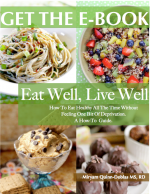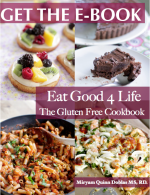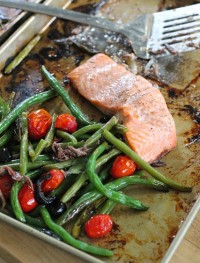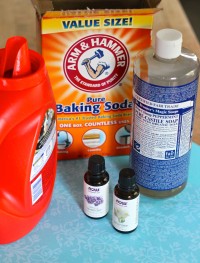Real Food Defined
So what is real food?
Food: Something that nourishes, sustains, or supplies
Real: True and actual; not artificial
I consider real food: Food that is as close to its natural and original state without any alteration of any kind.
But before I give you more detail into what you should eat and what you shouldn’t eat let me give you some very powerful information and statistics.
Can eating a healthy diet prevent chronic disease? You bet it does. Here is one of my favorite quotes ever.
There is an undeniable correlation between nutrition and disease. A general conclusion that can be drowned is that reducing and modifying an unhealthy lifestyle will substantially decrease, if not eliminate, risk factors in developing chronic disease. If we obtain the proper nutrition, the body, the cells, and genes, will become more resilient and capable to conduct the complex mechanisms of the human body and at the same time detoxifying and preventing disease. Food is not just fuel, it is medicine.
There are thousands and thousands of studies that have made the correlation that poor nutrition is linked to chronic disease and yet, after knowing this valuable information, there are still millions of people dying from it.
The quality of food we eat has a huge impact on our well being as a whole. By studying molecular genetics I was able to see this first hand. When you feed your genes right, your genes change. You turn on genes that prevent disease and turn off genes that promote it and simply evolve your body in such a way that you maximize your body’s full potential.
Here are some statistics.
Chronic diseases are the leading causes of death and disability in the U.S.
- 7 out of 10 deaths among Americans each year are from chronic diseases. Heart disease, cancer and stroke account for more than 50% of all deaths each year.
- Obesity has become a major health concern. 1 in every 3 adults is obese and almost 1 in 5 youth between the ages of 6 and 19 is obese.
- A total of 27% of the US population are obese, one quarter of the population!
- About 600,000 people die of heart disease in the United States every year–that’s 1 in every 4 deaths.
- Coronary heart disease is the most common type of heart disease, killing more than 385,000 people annually.
- Every year about 935,000 Americans have a heart attack.
- Coronary heart disease alone costs the United States $108.9 billion each year.
- Diabetes continues to be the leading cause of kidney failure, non traumatic lower-extremity amputations, and blindness among adults, aged 20-74.
Aren’t these statics scary? We are getting sicker and sicker. The US is predominantly sick, and sick care is what we have upon us. We are ultimately the ones to blame, but there are also contributing factors to this sick care society, these being the food and pharmaceutical industry for sure.
These two giant industries are profiting from a sick population. They are, and will continue to make that their mission. Because of the big influential food and chemical lobbyists that exits in the white house, keeping a toxic and sick population is their main concern, goal and aim.
Making cheap, unsafe and poisonous food is a huge business and to make sure that the food and pharmaceutical industry can continue to do this is where lobbyists come into place. Do you want to guess how much money these lobbyists spend a year making sure you and I have a greater chance to be and remain sick?
There is a total of 3.28 billion dollars spent by lobbyist each year in Washington making two of the biggest ten lobbyists the agribusiness and big pharma industry.
Agribusiness lobbies represent a diverse collection of special-interest groups, including large food manufacturers like Kraft, huge agricultural companies like Monsanto, and tobacco companies. These companies spend upwards of $150 million each year, funding campaigns and pushing legislation through Congress. Agribusiness lobbyists are responsible for holding up bills regulating food labeling, and climate change among other things.
On the other hand, the pharmaceutical and health products industries have been one of the biggest and most powerful lobbies in Washington. Drug companies enjoy more power and influence in America than with any other government in the world.
Sure these industries play a huge role in determining what is in our supermarkets, restaurants, pharmacies, schools etc but we all ultimately still hold the key to our own health. They can make it as hard as they would like it to be but I will never give up and bend to their nonsense policies and money making food strategies just because they are every where.
The good news is that people are starting to catch up and demand better quality products. Slowly but shortly we are seeing more organic and natural products out there and sending a message that perhaps will reshape how these companies think in how they conduct business.
Understanding that eating healthy should become a priority and not falling in the sick care trap is key. Increasing health care costs, an obesity epidemic that is upon us, private industries that profit from a sick population, and suffering from a chronic disease that can decrease once quality and expectancy of life are reasons enough to want to turn things around, don’t you think?
If you want to take action here are some things you can do
WHAT CAN YOU EAT
Whole foods such as fruits and vegetables, and some preferably organic, dairy, also preferably organic, whole grains, wild caught fish (which are free of harmful chemicals), organic or grass feed meat (which are free of hormones and antibiotics), organic poultry, legumes, nuts, seeds, unrefined sweeteners (like raw honey and maple syrup), whole grains (like brown rice, 100% whole wheat bread and whole wheat pasta). Real food is whole foods which is unrefined and unprocessed and does not contain added ingredients, such as salt, simple carbohydrates, or fat.
With a rich real food diet you will obtain an array of needed nutrients that will contain a high concentration of antioxidant phenolics, fibers and numerous other phytochemicals that may be protective against chronic diseases. Eating real food it simply a win win situation.
There is still a lot of controversy in whether or not certain products should be purchased organic. At this point, in my professional and personal opinion, there is no question that organic is best when it comes to certain products like dairy, meat and poultry and certain fruits and veggies. Maybe back in the day when there was non GMO products existent in the market, different strains of fertilizers, and a different array of chemicals lingering in our food supply, I would probably wouldn’t care to buy organic items. Today, it is a different story. The FDA each year introduces a large amount of chemicals in our food supply, and yet hardly any are tested for their damaging risk to the human body.
Out of season foods are now available year round flown and trucked from miles away where harmful chemicals are used to keep these foods intact. There are hormones, antibiotics and many other chemical substances utilized to grow cattle really fast. Did you know that it takes about 2 1/2 years to grow a grass feed cow versus 14 months a corn feed one? In addition a corn feed cow will lack any omega 3’s, which is present in grass feed cows, have a much higher percentage of saturated fat and spread E-coli much rapidly.
I think, today, organic is best!
There are different things you can do and strategized to decrease your grocery bill if budget is an issue and you want to still get organic items.
- A lot of these items can be purchased in bulk or when in season.
- Becoming a member of a CSA farmers program can ensure that you are getting local, fresh produce for a fraction of the price.
- Buying items at your local grocery store when on sale.
WHAT NOT TO EAT
Processed food that is fake and junk that have little to zero nutritional value, are high in calories, highly processed, ready to eat and with little preparation. These foods are normally high in fat, sugar, and salt which makes you overweight and sick!!
Some examples are
- Packaged high-calorie snack foods, like chips and cheese snacks
- Convenience foods like frozen dinners and pizza
- Boxed meal mixes, loaded with sodium and fat
- White pasta, white bread and white rice
- Canned foods with lots of sodium
- Sugary breakfast cereals
- Pies and cake mixes
- Soft drinks
Here are other ingredients you should consider not eating that have been banned in the European Union since the 80’s.
How you can eliminate eating processed food?
Here is a simple guide to start you on the right path. For more detailed and comprehensive information see EAT WELL LIVE WELL E-COOKBOOK
- Cook your meals from scratch using whole ingredients. This can be a daunting task for someone not used to cooking but you can start by cooking once or twice a week and increasing the number as you get comfortable in the kitchen.
- Plan out your meals to avoid several trips to the store, this will ensure you will have the ingredients you need to cook your meal for the week and help you avoid purchasing package processed food. Plan well balanced meals that include plenty of whole grains, organic veggies and fruits as well as lean and organic or grass feed poultry and meat. Shop for fruits and vegetables that are in-season and local since they will be freshest and cheapest. Look for local farmers markets, or ask your grocer what produce items are in season.
- Stay away from the middle isles which normally contain the bulk of the processed foods. If you must buy items like tomato sauce buy them organic and in glass containers. If you buy pasta, rice, bread, couscous, flour etc make sure you get the whole grain kinds.
- Make sure you read ingredient labels and don’t purchase anything you wouldn’t be able to pronounce or buy to stock your pantry with.
- Try cooking one item you would have purchased in a processed, packaged form. When you make it yourself, you know exactly what is in it being able to decrease the sugar, salt, and fat content as well as increasing the quality of ingredients. For example, if you like certain cookies you can try making them yourself by adding less sugar and of the unrefined kind, better fat alternative as well as using whole wheat flour in place of the processed kind and perhaps even making it grain free.
Here you can obtain more information on my food philosophy and how it is that I keep at home.
If you need more help Eat Well Live Well can guide you in more detail.




 Hello there. My name is Miryam and I am the clinical dietitian and Physician Assistant behind Eat Good 4 Life. My wish is to inspire you to start cooking healthier so that you can live a longer and happier life. Thanks for stopping by (
Hello there. My name is Miryam and I am the clinical dietitian and Physician Assistant behind Eat Good 4 Life. My wish is to inspire you to start cooking healthier so that you can live a longer and happier life. Thanks for stopping by (






